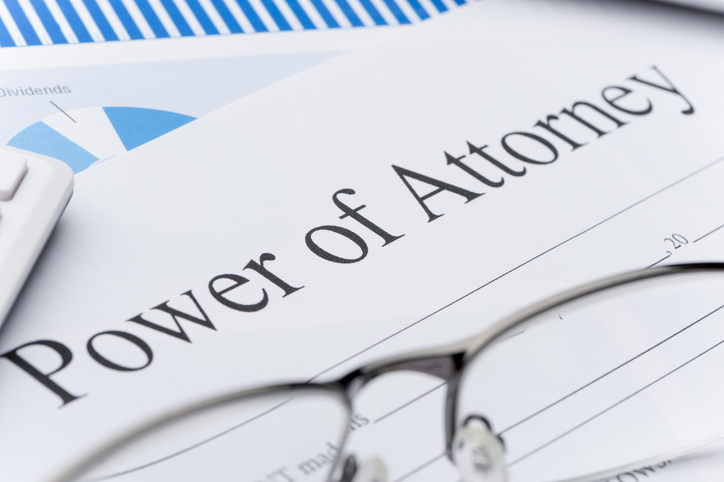POWER OF ATTORNEY EXPLAINED
At times individuals will ask us what a power of attorney is. In short, a legal document that gives someone else the power to act for you
Perhaps a more thorough answer is a power of attorney is written authorization given by one person, a “principal,” to another person, an “agent,” to perform certain acts on the principal’s behalf. The instrument granting authority is called a “power of attorney.” A principal may authorize an agent to do any act the principal might do, except those which require the principal’s personal attention.
TYPE OF POWER OF ATTORNEY
The powers you grant to an agent to act on your behalf are sometimes thought of in two groupings, with one agent to make “health-related decisions” and the other to decide on “everything else.” Of course, this may be two different agents with entirely different instructions. For these reasons, you regularly see the two sets of powers drafted as separate documents.
We will cover health-related decisions in a later article. Today, we will cover the “everything else” classification, which includes personal business decisions, financial-related matters, accounts in your name, and generally any party trying to deal with you directly.
To begin, we will start with four commonly recognized types of powers of attorney.
- GENERAL POWER OF ATTORNEY – A General Power of Attorney gives the agent FULL AUTHORITY to transact any and all business for the principal. For example, an agent with a General Power of Attorney can sell the principal’s home, execute a note and deed of trust, purchase and sell stocks held in the principal’s name, and sign contracts for the principal. Often the document can be considered invalid if you become incapacitated.
- LIMITED POWER OF ATTORNEY – A Limited Power of Attorney is terminated by the expiration of an event specified in it, or time period. For example, you may only appoint an agent with a Limited Power of Attorney to take care of a specific transaction or a business-related matter, such as signing a tax return. Another example is an agent appointed to act for a specified period, such as while you recover from a medical procedure.
- SPRINGING POWER OF ATTORNEY – A Springing Power of Attorney goes into effect when something occurs. In other words, this power “springs” into action at a particular date, event, or situation – usually incapacity. For example, an agent with Springing Power of Attorney could be called upon to act if you become incapacitated or are delayed out of the country.
- DURABLE POWER OF ATTORNEY – A Durable Power of Attorney is similar to a General or Limited Power of Attorney. This will typically survive the principal’s later physical or mental incapacity, which is why they are described as “durable.”
CHOOSING THE RIGHT AGENT
Appointing the best individual to act as your agent is one of the most critical aspects of creating your Power of Attorney. Having an agent who has your confidence and the trust and respect of those around you is vital to ensuring that things happen as expected when you are otherwise unable to act.
In addition to having your confidence, the agent should typically have the requisite knowledge or ability to reasonably figure out how to make and carry out the best decisions for you.
NUMBER OF AGENTS
Our clients commonly ask us if they should appoint more than one individual. This question is best answered in two parts.
The first part is that you can appoint more than one individual to act as an agent, and often with our clients, we conclude that if the individuals act simultaneously, they must be able to act independently. An example is when dealing with a bank, which cannot reasonably be expected to know if two individuals signed a receipt or entered a PIN into an ATM.
The second part appointing more than one agent requires some thought as to the “succession” of agents. An example is when a different individual must act if the primary agent cannot – we refer to this as an alternate agent. The appointment and succession of agents are often crafted to fit individual needs.
TERMINATION OF POWERS
Recall we covered that a power of attorney can end upon the happening of a particular event. A power of attorney can likewise end by revocation by the principal; the principal or agent’s death or incapacity; or divorce, annulment, or legal separation of the principal and agent if they happen to be husband and wife.
Last, we also covered that a springing power of attorney can work when a specified occurrence happens and can also be limited in some fashion to extinguish the power and the end or completion of an event.
CONCLUSION
A power of attorney is only one component in a comprehensive estate plan. You should note that a party dealing with your agent is not required to honor a power of attorney. In such cases, other components in an estate plan, or legal mechanisms, are used to accomplish the proper objective. A power of attorney can be effortless to understand and easy to mess up when drafting language that must be precise, thoughtful, and clear to others.
In the following article expanding on the basics of a power of attorney, we will cover things to avoid and considerations to have when trying to make things simple for those around you.
If you want to discuss your situation in more detail, please call us at (805) 934-4600 to schedule an appointment today.
